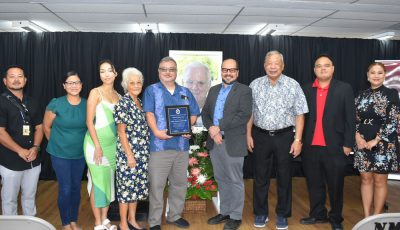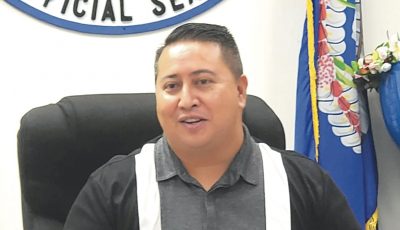‘The needs of the US territories require unique treatment’
Editor’s Note: The following is the text of the written testimony of Gov. Ralph DLG Torres before the House Committee on Natural Resources hearing on Feb. 27, 2019.
Good afternoon. Chairman Grijalva, Ranking Member Bishop, Vice Chairman Sablan and members of the committee, thank you for the time you have provided to this hearing on H.R. 560 and the ongoing issues relating to the CNMI’s complex transition in to the U.S. immigration system and for allowing the submission of this written testimony for the record.
Since my last testimony before this committee, much has transpired in the CNMI’s efforts to hire more U.S. workers, reduce our dependency on foreign workers, create an even playing ground for all workers to compete in and create a viable economy in the Western Pacific.
I wish to thank the members of this committee for your support of the Northern Mariana Islands U.S. Workforce Act. This has provided much needed relief from the impending termination date of the CW-1 program and permitted the economy to continue to survive. This year would have seen half of the CNMI’s workforce leave the island and a collapse of the economy if action was not taken. For this reprieve, and for your understanding of the unique circumstances facing our Commonwealth, thank you.
Yet, we are here once again to discuss necessary amendments to the immigration provisions of our Covenant. The CNMI has just experienced the worst typhoon to hit our shores in generations. In fact, it was the strongest such storm to hit the United States since 1935. Winds exceeded 185 miles per hour. There is still much work to be done at home, but I feel it is necessary to be here to discuss this issue because we must take every opportunity we have available to us to spread the understanding that the needs of the CNMI people are unique within the United States. We face challenges with geography and demographics that magnify our constraints, and we must deal with these challenges with far fewer resources.
The provisions of H.R. 560 recognize the unique characteristics of our society, the complex history that led us to the community we have today, and it highlights the fact that the transition period put into place in 2008 is a work in progress in creating a system that avoids adverse impacts to our people.
We live in the effects of actions of Congress. We must deal with the decisions of our forbearers who crafted the Covenant, and their negotiated agreement to allow the young government of the Northern Mariana Islands the ability to grow its economy through local control of immigration. We live with the intended and unintended consequences of Public Law 110-229 which took that control away. And it is our responsibility to do what is right in the effort to meld three decades of local control with 10 years of experience within the transition period. To me that is what H.R. 560 works to accomplish. A simple recognition that the transition period created 11 years ago was not a finished product and that we share in the responsibility to recognize areas of additional concern and rectify them in good faith with the best interest of the people of the CNMI in mind.
The solutions presented in H.R. 560 are important but only comprise a piecemeal effort to respond to the unintended consequences of the transition period.
In 2017, H.R. 339, the Northern Mariana Islands Economic Expansion Act, was signed into law, and the ability to petition construction workers to perform work in the CNMI under the CW-1 program was prohibited. We were told that this should be of little concern as the construction needs of the Commonwealth could be met sufficiently by the H2-B visa program.
However, the U.S. Department of Homeland Security recently provided a new interpretation of the H2-B program, effectively removing eligibility of general contractors from applying and receiving labor as their needs do not qualify as “temporary”. Now in order to obtain a foreign construction worker a business must apply for the worker directly. Small businesses, and home owners do not have this ability. Further the removal of Philippines from the list of eligible source countries for H2-B labor has further limited legal avenues for foreign labor.
We saw the issues almost immediately after the enactment of H.R. 339, but the situation today is far more dire. After the onslaught laid upon the CNMI from Super Typhoon Yutu [in] October 2018, four out of every 10 homes in the CNMI were destroyed or suffered major damage. Across the island, you will see rows of [Federal Emergency Management Agency]-issued tents and families sheltering their children and their possessions next to the shattered remains of their homes. A construction effort is needed to secure the safety and wellbeing of these families in a scale never before seen in the CNMI since the end of World War II, but we simply do not have the means to do so.
This is not a new concern. After the damaging effects of Hurricane Harvey in Texas, the population there experienced a severe shortage of construction labor to rebuild homes and communities. Building costs soared and those with fewer means suffered the most to rebuild as contractors were struggling to keep pace with the demand. This shortage came even as the demand had the ability to source and transport labor and equipment from any of the 48 contiguous states through connected roadways.
The CNMI is 8,000 miles from Washington, D.C. I had to travel 24 hours to be here today at nearly twice the cost it would be for someone here to travel to Mumbai. For weeks following Typhoon Yutu, we had to resort to bringing in bucket trucks, forklifts, and trailers to support the emergency recovery efforts in the CNMI through the establishment of a continual airbridge supported by several Antonov aircrafts. Residents were left without power for months as transformers and concrete power poles waited for air transport. Doing anything in the Northern Marianas is more difficult.
With the lessons learned in Typhoon Soudelor in 2015, Typhoon Mangkhut in September of 2018 and seeing the tremendous need after Typhoon Yutu, FEMA and the Department of Defense recognized the challenges of performing their necessary work for the American citizens living in the CNMI by seeking out new and innovative solutions that conformed to our unique circumstances.
One week after the disaster, DoD and FEMA officials announced a program in collaboration with the CNMI called the Temporary Emergency Tent and Roofing Installation Support or TETRIS program. Under TETRIS, the Joint Task Force West, saw more than 1,000 uniformed service members mobilized in support of the relief efforts. Seabees from the 30th Naval Construction Regiment and the 254th Rapid Engineer Deployable Heavy Operation Repair Squadron Engineers were activated in the hundreds to support the installation of tents and emergency roof repairs for the thousands of affected homes because local manpower and resources could not scale in the capacity necessary to prevent further loss of life, mitigate suffering and reduce the impact of the disaster.
If it were not for the 200 men and women of the Seabees and the Red Horses, 184 homes [on] Tinian would be without roofs over their heads because there are no available construction workers there. On Saipan, this collaborative force installed 362 roofs, easing the urgent demand for construction labor but by no means created a long-term solution for these families.
Further FEMA recently approved a Permanent Housing Construction Program that will source and provide labor and materials to reconstruct the homes of eligible households. Currently there are 9,400 applicants for this program and FEMA is in the process of looking toward bringing in labor from outside the CNMI because of the lack of local manpower. The homes that are selected will be fortunate. Now as FEMA and SBA resources have been released to the residents of the CNMI, the thousands of homes remaining will not be able to afford the cost of transporting labor nor will there be available contractors to help rebuild their lives.
The Department of Defense and FEMA have experienced the challenges we live with daily when it comes to labor and have created new pathways to work around them. I ask that you consider their experience and join it with the experiences of our private sector partners who are struggling to grow our economy and hire our people in the face of the restrictions imposed on us by Washington, D.C.
We are an island, surrounded by the world’s richest economies, but are limited in our growth by the size of our land, the cost of our capital and the restrictions imposed on our access to labor. When we are to compete in a competitive global economy how are we to survive in direct competition with booming economies of Philippines, Thailand and Vietnam while being more vulnerable to natural disasters and placed under US laws that were designed for the economies as diverse and resilient as California or New York.
I ask you, how would you help the 52 percent of our population who live beneath the federal poverty line achieve the standards of living equal to that of their American counterparts in the states in these conditions?
The CNMI does not wish to be a problem for Congress to solve. We want to grow and succeed as proud Americans in a geopolitically sensitive region of the world. Getting us to that point requires additional changes to the structure of our transition period that recognizes our challenges.
I ask that Congress revisit the immigration provisions of our Covenant and allow for the rebuilding of our homes and our community.
I respectfully request passage of H.R. 560 to allow for those in our community who have built our islands over the last decades of our development remain and contribute to their neighbors. I ask that we reconsider the prohibition of construction labor under the CW-1 program to allow for the CNMI to determine the allowable cap on construction permits available to both safeguard the scarcity of these permits and allow for the necessary construction of our islands. And I ask that Congress replicate the program allowed for our neighboring island of Guam and their military buildup program and permit the entry of construction workers under the H2-B program to work with general contractors and construction companies as we continue the long rebuilding process ahead of us.
I wish to offer you two recommendations for legislative remedies to this issue and request your cooperation in finding a positive outcome for the CNMI:
I ask for your consideration in providing amendments to U.S. Public Law 115-218 to include an exemption to the prohibition on Construction Occupations, Sec. 6(a)(3)(D)(v), for petitions within a maximum allowable quota that will be provided annually to the Secretary of Homeland Security and Secretary of Labor under Sec. 6(b)(3)(B) of the law.
Additionally, I ask that you consider an amendment that would mirror the provision contained in U.S. Public Law 115-232, Sec. 1045, allowing for H2-B workers to be granted admission into the CNMI to perform labor in the performance of contracts or subcontracts for construction, repairs, renovations, or facility services that is connected or associated with a Presidential Disaster Declaration for a period of 5 years following the declaration. Altering the circumstances from Guam, the federal agency that would collaborate in this process to certify these activities were connected with the recovery efforts would be [FEMA].
Critical for this recommendation is the allowance for the CNMI government or a regional labor entity, such as those currently present in Guam, to be the responsible party in the issuance of Foreign Labor Certifications. As is currently the practice in Guam under U.S. Public Law 115- 232, a local certification authority would be responsible to work alongside FEMA representatives to define eligibility requirements and processes for petitioning foreign labor in construction occupations related to the repair and recovery of our islands. I am not here asking for financial support. I am asking for your understanding and for your permission to make do with what limited options are available to us to help our people succeed. I am not asking for new solutions, but the replication of concepts Congress has already employed. It was under previous provisions and interpretations of U.S. Public Law 110-229 that the CNMI economy grew 28.6 percent in 2016 and 25.1 percent in 2017. We should adjust, amend and reconsider our actions in effort to provide more for those in the CNMI living far below the standards of our larger American community.
Your support of H.R. 560 is a monumental step toward that direction, but I ask that it not be the end of these conversations. We must continue to recognize when federal actions come into conflict with the realities of life in the Western Pacific. And as we work together on these issues, I hope to gain your understanding that the needs of the U.S. territories require treatment unique to them.
***
Ralph DLG Torres is the governor of the Commonwealth of the Northern Mariana Islands.



























